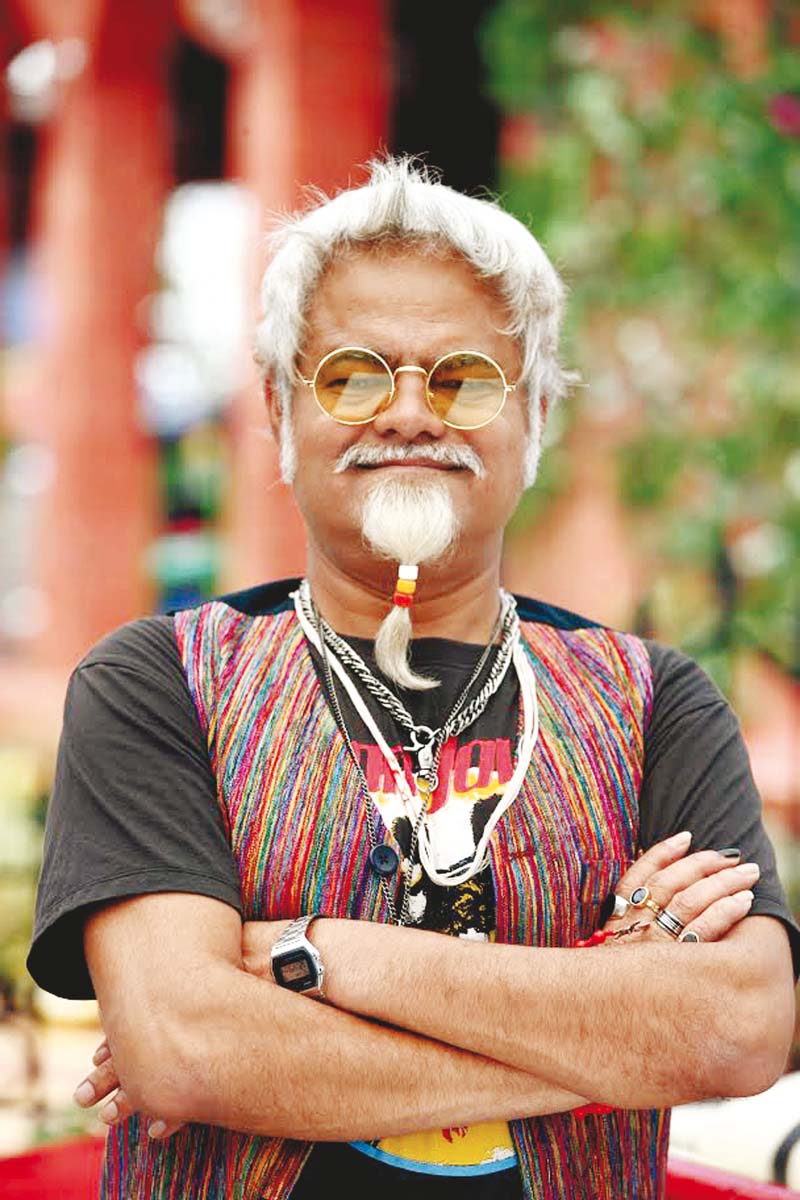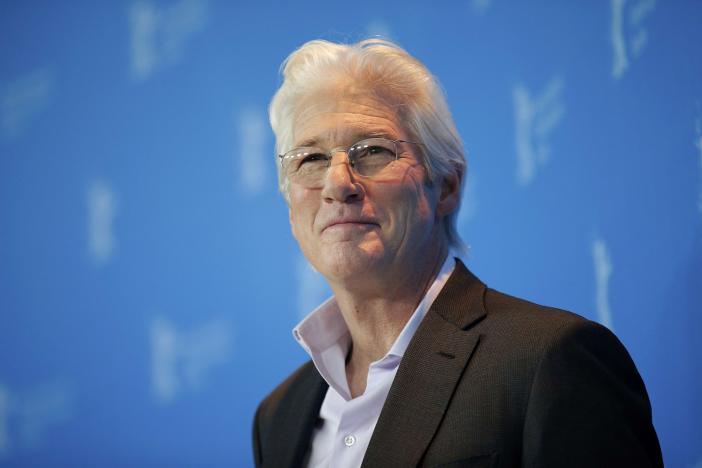
Sanjay is already past his silver jubilee in the industry. Over the last 25 years, he has acted in approximately 110 films and countless television shows and commercials. From donning tacky jackets for comic roles to balancing fake moustaches on his upper lip to play a bandit, and from wearing the accent of Bihari police constables to essaying the hapless father of a rebellious girl, Sanjay accepted whatever the industry threw at him. Turbulence has been the only constant in his career, with a story etched in each wrinkle on his forehead.
 PHOTO: RED CHILLIES ENTERTAINMENT
PHOTO: RED CHILLIES ENTERTAINMENTBorn in Patna, Sanjay grew up playing on the streets of Banaras — the city maestros such as Ustad Bismillah Khan and Pandit Ravi Shankar called home. Hearing these towering musicians play and influenced by acts as diverse as Jim Morrison and The Beatles, the young, impressionable Sanjay thought he might as well try his luck at music. “I tried playing musical instruments but I soon realised I was up to no good.” He was also not a diligent student which meant things were never good in school. Nonetheless, the rather unusual support of his parents brought him to the gates of the National School of Drama in New Delhi. “Papa kehte thay tu actor acha hai (My father would say I am a good actor),” he recollects. Sanjay graduated in 1989, around the time actors like Irrfan Khan, Piyush Mishra and Tigmanshu Dhulia were also honing their skills behind the walls of the prestigious institution, and, in his own words, his struggle hasn’t ended yet.
For nine straight years, Sanjay was out of work. “I came to Mumbai to become an actor. I did almost everything along the way. I even worked as a journalist and pestered people for interviews,” he says. It is perhaps this very adversity that made Sanjay what he is today. “Admi ko girna nahin chahiye (A man should never give up). That rough patch was part of the process.”
Borderline comedy
Knowing too well what it is like to struggle, Sanjay is particularly happy to see Pakistani cinema grow. “Hearing good news from Pakistan is very heartening,” he says. “The attack on schoolchildren in Peshawar left me speechless. I have never visited Pakistan but I surely will if I get the chance.”
If there is one thing Pakistani that tugs at Sanjay’s heartstrings it is none other than food. “YouTube pe Pakistani khanay bananay ke tareeqay dekhta hoon (I watch how to cook Pakistani dishes on YouTube). I bring your Shan Masala home wherever I find it. Whatever you make with it, it turns up the flavour,” he says. Despite little difference between the two cuisines, Sanjay prefers Pakistani food. “My grandmother used to say, learn the hows of eating from the English, the hows of preparing food from the Muslims and the hows of keeping the kitchen tidy from the Hindus,” he recalls. Food is clearly Sanjay’s area of expertise. He is known for cooking even on film sets. “I love how you people prepare mutton,” he says, before quickly asking, “Apke ghar aaj kya bana hai khanay mein? (Which dish has been prepared at your home today?) Mere han to khichri bani hai (Khichri has been prepared at my home).”
Sanjay’s appreciation for Pakistan does not end with food. Despite acting in one of Indian television’s most popular sitcoms, Office Office, Sanjay is not a fan of TV programming in his country. “I never liked Indian television. They have nothing new to show,” he says. On the flipside, he is a die-hard fan of Pakistani dramas aired on Zindagi TV in India. “Pakistani dramas hinge on realism in both storylines and acting, and that is what I love.”
 PHOTO: RED CHILLIES ENTERTAINMENT
PHOTO: RED CHILLIES ENTERTAINMENTOffice Office featured Sanjay essay the role of a paan-spitting peon (Shukla) at a government office who demands bribes upfront, even if someone wants an answer to a simple query. “I was at Wagah Border once. The Pakistanis on the other side recognised me and asked me to cross over so that they could offer me paan,” he recalls. Sanjay says the show gained popularity in Pakistan as well because it underscores problems that are shared by the underprivileged on either side of the Line of Control (LoC).
LoC reminds Sanjay of the TV serial Life Out of Control wherein he played a Pakistani cook, Chand Malik, who works with an Indian cook, Gurpreet Malik, at an Englishman’s restaurant in London. “In that drama, there was a scene where my character is celebrating August 14. I improvised and climbed a street pole and hoisted the Pakistani flag on it. The locals saw us filming and threw random things at me. At that moment, I thought I am playing a Pakistani and I cannot dishonour the Pakistani flag.” Sanjay feels political friction between the Indian and Pakistani governments is just a gimmick to keep us busy. “A generation will come that will reject these divisions completely.”
Sanjay is a strong proponent of interfaith and intercommunal harmony. The title of his directorial debut art film Pranaam Walekum, which is still in its development stage, is an example of this. About the cancellation of ghazal singer Ghulam Ali’s concerts in India, Sanjay says, “Ghulam Ali sings for neither India nor Pakistan. His audiences are adherents of high art that transcends borders.” He backs up his view with the example of ghazal maestro Mehdi Hasan whose singing brings tears to his eyes to this day. “There is not a house in ‘Dilli’ that hasn’t had cassettes of Umar Shareef’s shows.” Sanjay’s pluralistic views perhaps take root in the works of two of his biggest literary inspirations — Saadat Hasan Manto and Munshi Premchand.
Making movies is not a joke
With his career on the rise, Sanjay is currently part of Rohit Shetty’s highly anticipated Shah Rukh Khan-starrer Dilwale. This was not his first time working with the Bollywood superstar. “I worked on a film with Shah Rukh long time ago. There is something about him that makes him what he is. He is very grounded and full of energy.” Shetty and Sanjay have also enjoyed a longtime understanding, with the latter featuring in most of the former’s films. “Rohit Shetty is the boss of Indian cinema. This man’s conviction is unparalleled.” When asked to reveal more about his role in the film, Sanjay concludes, “Dilwale dekh ke log mere dialogue dohratay huey niklenge cinema se (After watching the film, people will leave the theatre repeating my dialogues). ”
 PHOTO: RED CHILLIES ENTERTAINMENT
PHOTO: RED CHILLIES ENTERTAINMENTWith Dilwale done and dusted, Sanjay has turned his attention towards other projects — Indra Kumar’s Great Grand Masti and Sajid Nadiadwala’s Baaghi: A Rebel for Love. His view of films in the Subcontinent is quite riveting. “Actually, our cinema was never ours. We borrowed ideals from the West and draped them in our colonial legacy. They also have people like Francis Ford Coppola but we deliberately chose not to adopt intellectually-sound cinematic traditions.”
Sanjay says the concept of beauty and the ideal storyline in our films are the products of this banal synthesis while disorientation with the region’s literature further dumbed the industry down. “We kept regurgitating the same formulae and they worked. Films are earning INR1,000,000,000 to INR2,000,000 these days, but a tipping point is around the corner. How far will this go? Today our audiences have the world on their fingertips. Their tastes and preferences are changing.” To illustrate this, he refers to acclaimed actor Nawazuddin Siddiqui, “Tell me why Nawaz has gained popularity? He doesn’t look like your ideal hero, but he does resemble the man standing at the bus stop or your neighbour next door.”
On a similar note, Sanjay says love is not the only subject for a film story. “Film-makers have begun to make movies on everyday subjects, stories of human interest. My film Dum Laga Ke Haisha is about an overweight girl being married off to an ambitious boy by force. These are real societal issues that we are touching upon. The film did extremely well.”
Sanjay’s claim is justified to a great extent. Three of his recent projects, Dum Laga Ke Haisha, Ankhon Dekhi and Masaan received critical acclaim and brought him in the limelight after decades of struggle. “My struggle has nothing to do with my choices. I took up whatever work was offered to me. The fault lies with the film-makers who never saw that in me,” he says. When asked whether a film like Ankhon Dekhi will ever be able to rake in money the way films like Kick do, he maintains, “A day will come, yes.”
The forlorn comic
The actor disagrees with the character-actor label that is associated with him. “They call me a character actor. An actor is nothing without his character.” Sanjay is surprised to hear that his work is taught in Pakistani schools of drama. “We are all actors in our lives. I act in my everyday life and that makes living the life on screen easy,” he says, following up with an abrupt pause. “I think I just repeated a dialogue from one of my roles,” he laughs.
Sanjay is aware of the fact that comic actors are not taken seriously and it is only the aforementioned films that helped him cement his identity as an actor who can do more than make people laugh. “They take on-screen crying seriously and think the one making them laugh is a fool.”
Ali Raj is a subeditor at The Express Tribune Life & Style desk. He tweets @AnaariKiBandooq
Published in The Express Tribune, Sunday Magazine, December 13th, 2015.

1732271743-0/diddy-(45)1732271743-0-165x106.webp)















COMMENTS (1)
Comments are moderated and generally will be posted if they are on-topic and not abusive.
For more information, please see our Comments FAQ